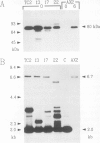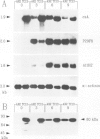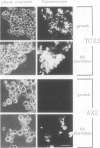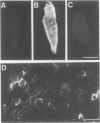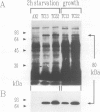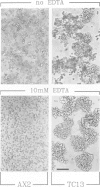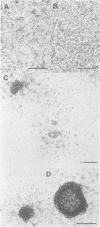Abstract
The contact site A (csA) glycoprotein is a developmentally regulated cell adhesion molecule which mediates EDTA-stable cell contacts during the aggregation stage of Dictyostelium discoideum. A transformation vector was constructed which allows overexpression of the csA protein during the growth phase. In that stage the csA protein is normally not expressed; in the transformants it was transported to the cell surface and carried all modifications investigated, including a phospholipid anchor and two types of oligosaccharide chain. csA expression enabled the normal non-aggregative growth-phase cells to form EDTA-stable contacts in suspension and to assemble into three-dimensional aggregates when moving on a substratum. After prolonged cultivation of csA overexpressing transformants in nutrient medium the developmental program was found to be turned on, as it normally occurs only in starving cells. During later development of transformed cells, the csA glycoprotein remained present on the cell surface, while it is down-regulated in the wild type. It was detected in both the prestalk and prespore regions of the multicellular slugs made from transformed cells.
Full text
PDF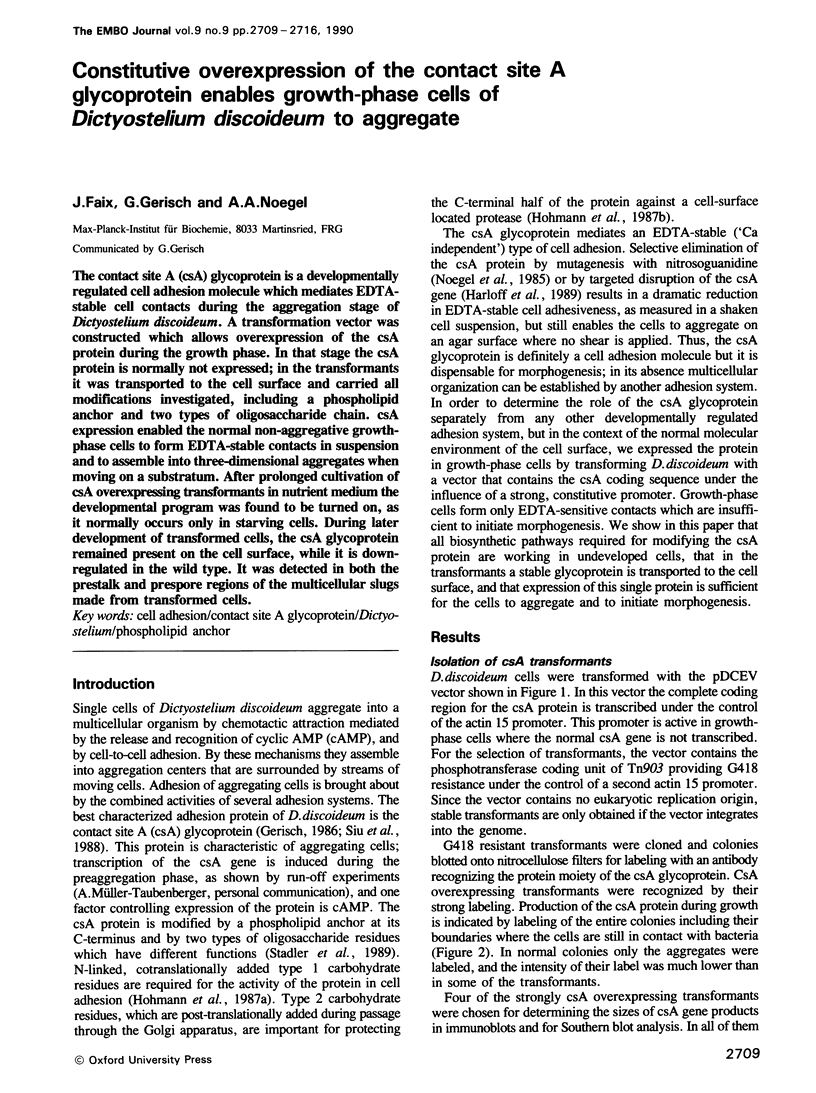
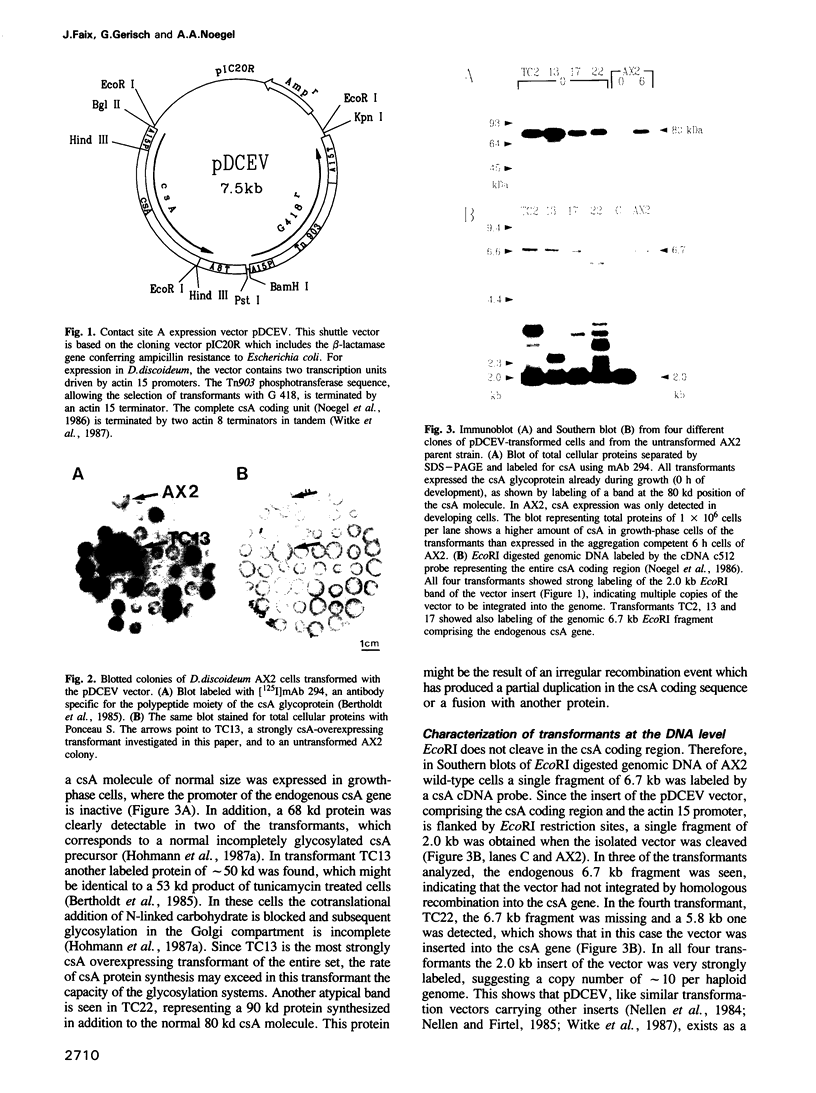
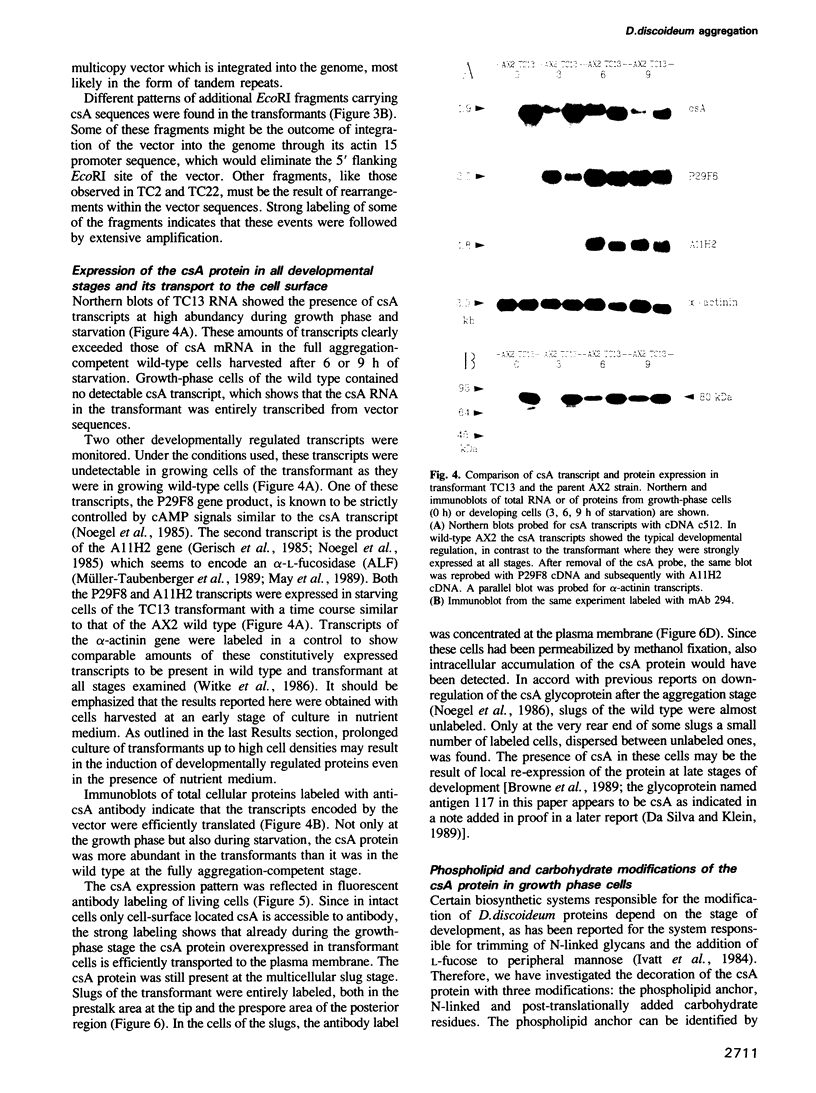
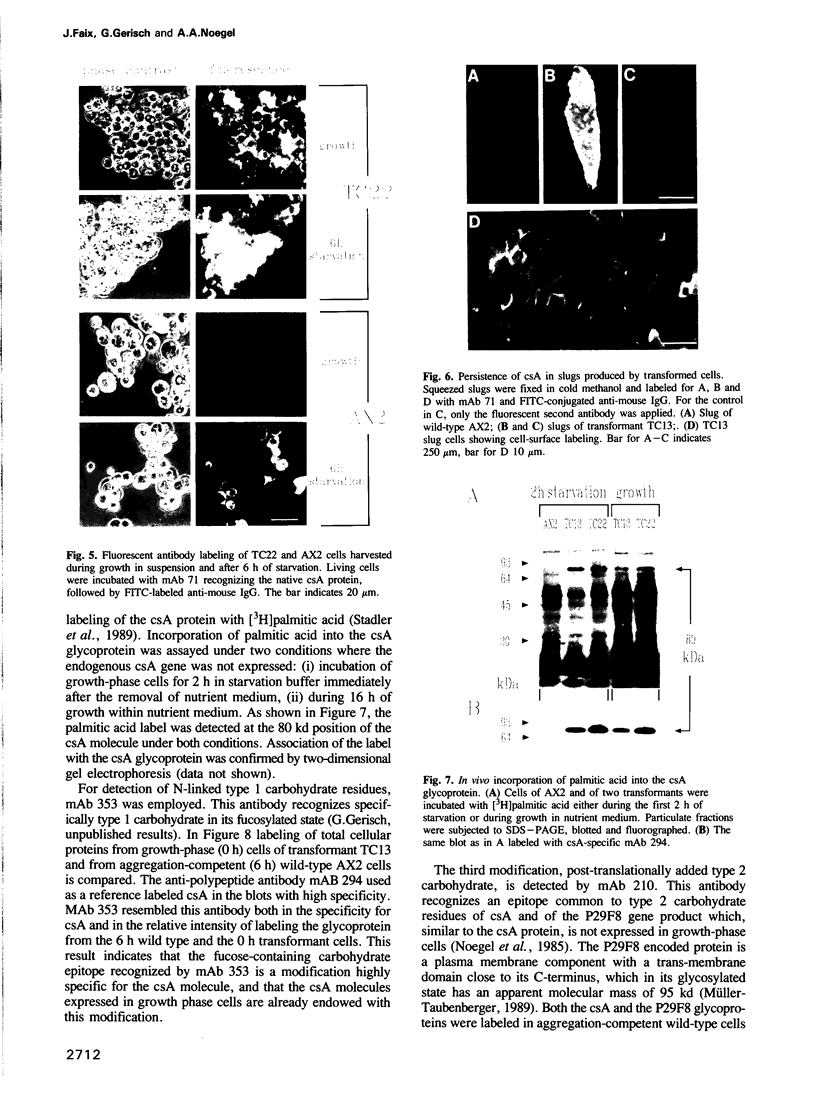
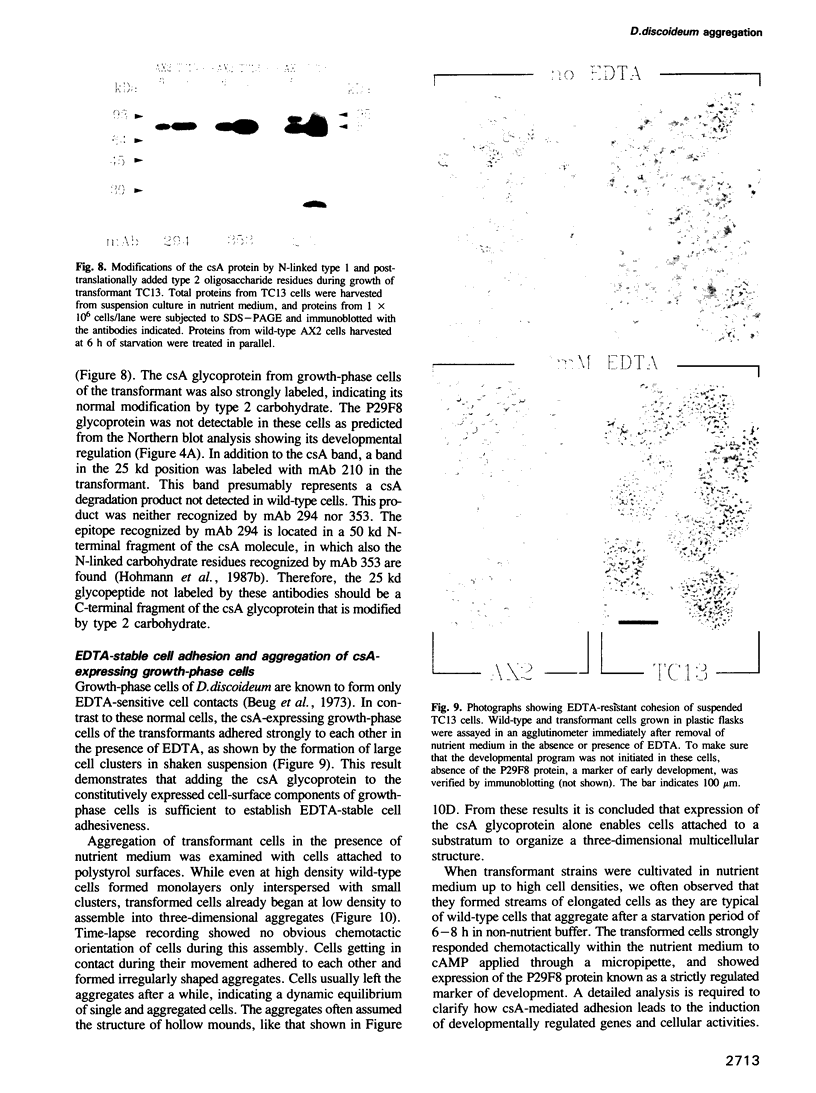
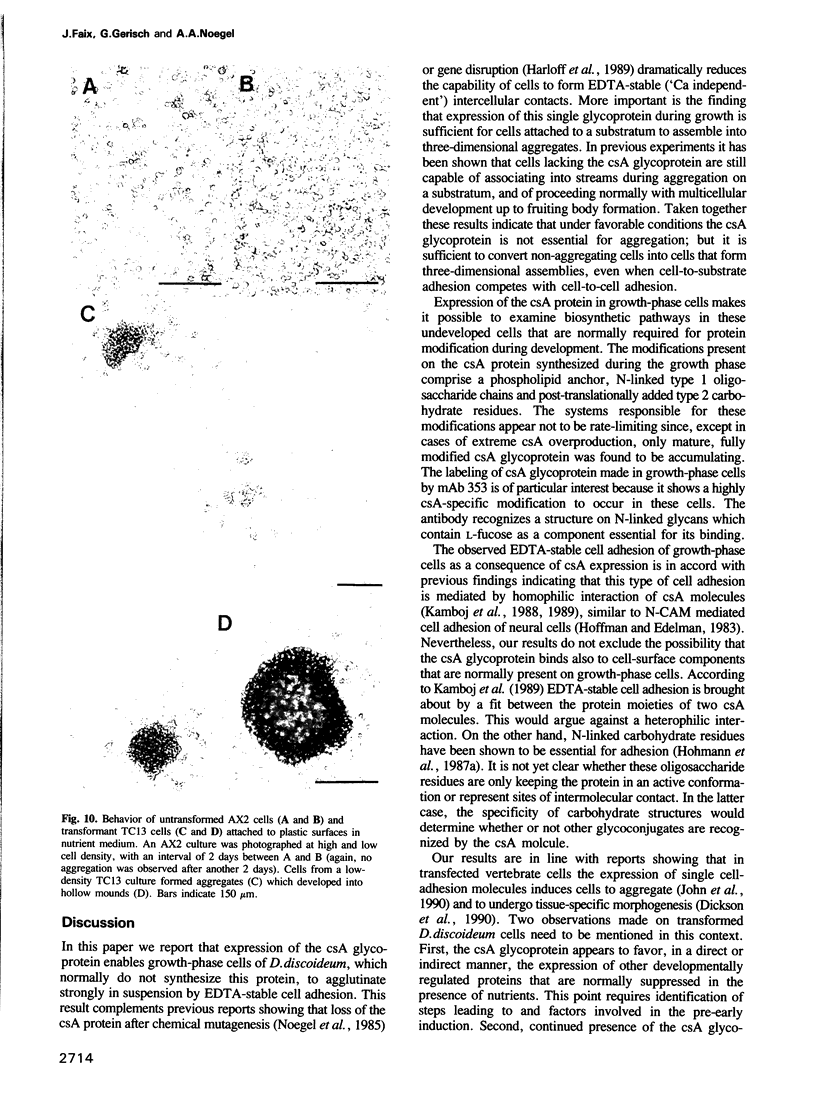
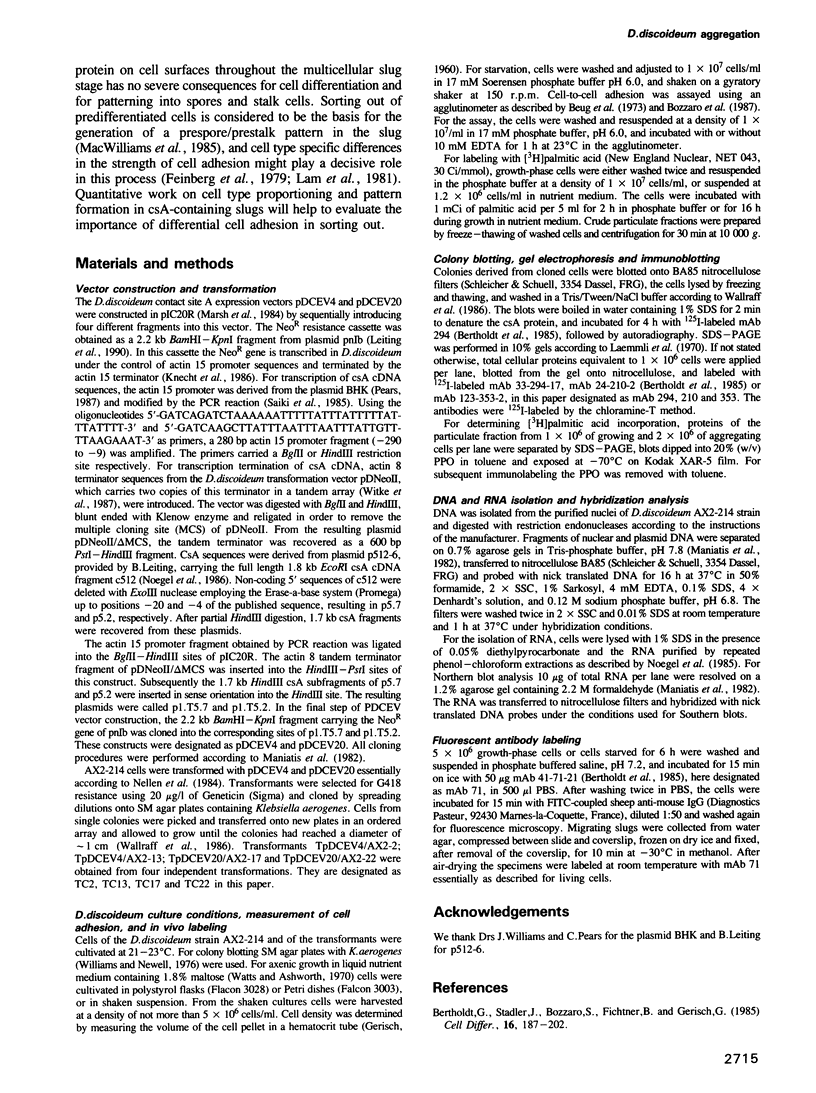
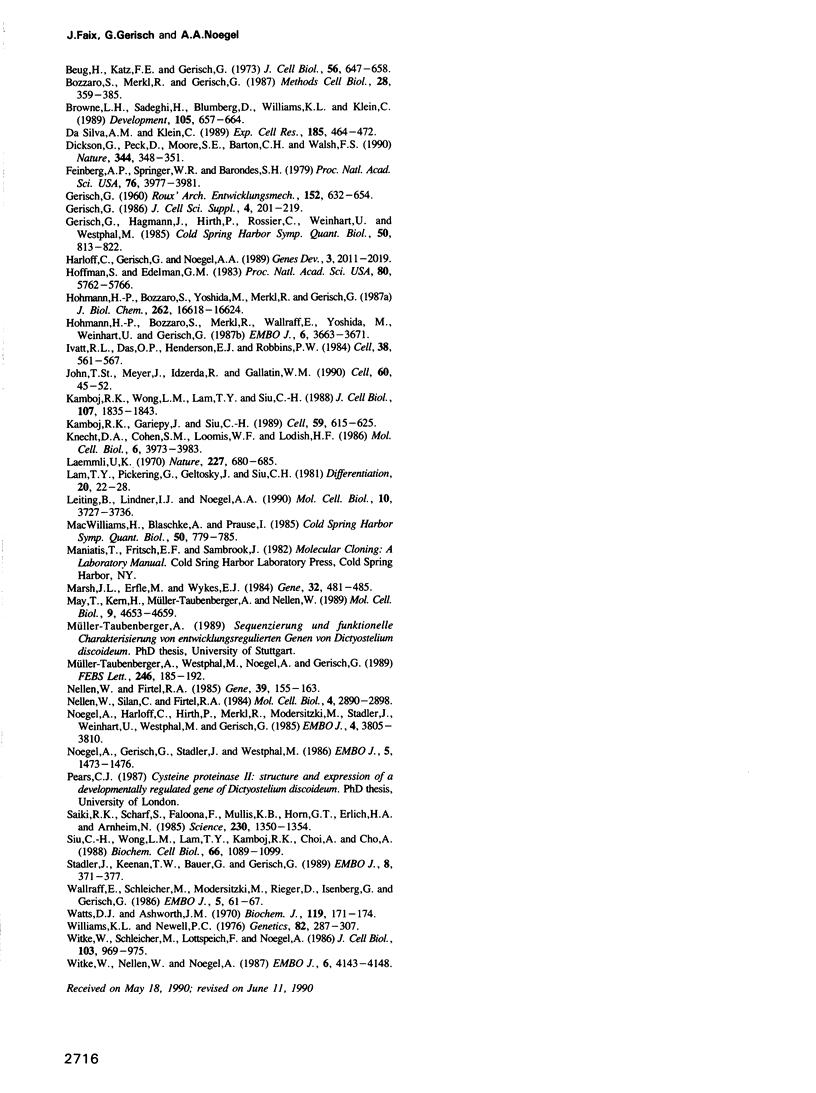
Images in this article
Selected References
These references are in PubMed. This may not be the complete list of references from this article.
- Bertholdt G., Stadler J., Bozzaro S., Fichtner B., Gerisch G. Carbohydrate and other epitopes of the contact site A glycoprotein of Dictyostelium discoideum as characterized by monoclonal antibodies. Cell Differ. 1985 May;16(3):187–202. doi: 10.1016/0045-6039(85)90516-0. [DOI] [PubMed] [Google Scholar]
- Beug H., Katz F. E., Gerisch G. Dynamics of antigenic membrane sites relating to cell aggregation in Dictyostelium discoideum. J Cell Biol. 1973 Mar;56(3):647–658. doi: 10.1083/jcb.56.3.647. [DOI] [PMC free article] [PubMed] [Google Scholar]
- Bozzaro S., Merkl R., Gerisch G. Cell adhesion: its quantification, assay of the molecules involved, and selection of defective mutants in Dictyostelium and Polysphondylium. Methods Cell Biol. 1987;28:359–385. doi: 10.1016/s0091-679x(08)61657-x. [DOI] [PubMed] [Google Scholar]
- Browne L. H., Sadeghi H., Blumberg D., Williams K. L., Klein C. Re-expression of 117 antigen, a cell surface glycoprotein of aggregating cells, during terminal differentiation of Dictyostelium discoideum prespore cells. Development. 1989 Mar;105(3):657–664. doi: 10.1242/dev.105.3.657. [DOI] [PubMed] [Google Scholar]
- Dickson G., Peck D., Moore S. E., Barton C. H., Walsh F. S. Enhanced myogenesis in NCAM-transfected mouse myoblasts. Nature. 1990 Mar 22;344(6264):348–351. doi: 10.1038/344348a0. [DOI] [PubMed] [Google Scholar]
- Feinberg A. P., Springer W. R., Barondes S. H. Segregation of pre-stalk and pre-spore cells of Dictyostelium discoideum: observations consistent with selective cell cohesion. Proc Natl Acad Sci U S A. 1979 Aug;76(8):3977–3981. doi: 10.1073/pnas.76.8.3977. [DOI] [PMC free article] [PubMed] [Google Scholar]
- Gerisch G., Hagmann J., Hirth P., Rossier C., Weinhart U., Westphal M. Early Dictyostelium development: control mechanisms bypassed by sequential mutagenesis. Cold Spring Harb Symp Quant Biol. 1985;50:813–822. doi: 10.1101/sqb.1985.050.01.099. [DOI] [PubMed] [Google Scholar]
- Gerisch G. Inter-relation of cell adhesion and differentiation in Dictyostelium discoideum. J Cell Sci Suppl. 1986;4:201–219. doi: 10.1242/jcs.1986.supplement_4.13. [DOI] [PubMed] [Google Scholar]
- Harloff C., Gerisch G., Noegel A. A. Selective elimination of the contact site A protein of Dictyostelium discoideum by gene disruption. Genes Dev. 1989 Dec;3(12A):2011–2019. doi: 10.1101/gad.3.12a.2011. [DOI] [PubMed] [Google Scholar]
- Hoffman S., Edelman G. M. Kinetics of homophilic binding by embryonic and adult forms of the neural cell adhesion molecule. Proc Natl Acad Sci U S A. 1983 Sep;80(18):5762–5766. doi: 10.1073/pnas.80.18.5762. [DOI] [PMC free article] [PubMed] [Google Scholar]
- Hohmann H. P., Bozzaro S., Merkl R., Wallraff E., Yoshida M., Weinhart U., Gerisch G. Post-translational glycosylation of the contact site A protein of Dictyostelium discoideum is important for stability but not for its function in cell adhesion. EMBO J. 1987 Dec 1;6(12):3663–3671. doi: 10.1002/j.1460-2075.1987.tb02699.x. [DOI] [PMC free article] [PubMed] [Google Scholar]
- Hohmann H. P., Bozzaro S., Yoshida M., Merkl R., Gerisch G. Two-step glycosylation of the contact site A protein of Dictyostelium discoideum and transport of an incompletely glycosylated form to the cell surface. J Biol Chem. 1987 Dec 5;262(34):16618–16624. [PubMed] [Google Scholar]
- Ivatt R. L., Das O. P., Henderson E. J., Robbins P. W. Glycoprotein biosynthesis in dictyostelium discoideum: developmental regulation of the protein-linked glycans. Cell. 1984 Sep;38(2):561–567. doi: 10.1016/0092-8674(84)90510-5. [DOI] [PubMed] [Google Scholar]
- Kamboj R. K., Gariepy J., Siu C. H. Identification of an octapeptide involved in homophilic interaction of the cell adhesion molecule gp80 of dictyostelium discoideum. Cell. 1989 Nov 17;59(4):615–625. doi: 10.1016/0092-8674(89)90007-x. [DOI] [PubMed] [Google Scholar]
- Kamboj R. K., Wong L. M., Lam T. Y., Siu C. H. Mapping of a cell-binding domain in the cell adhesion molecule gp80 of Dictyostelium discoideum. J Cell Biol. 1988 Nov;107(5):1835–1843. doi: 10.1083/jcb.107.5.1835. [DOI] [PMC free article] [PubMed] [Google Scholar]
- Knecht D. A., Cohen S. M., Loomis W. F., Lodish H. F. Developmental regulation of Dictyostelium discoideum actin gene fusions carried on low-copy and high-copy transformation vectors. Mol Cell Biol. 1986 Nov;6(11):3973–3983. doi: 10.1128/mcb.6.11.3973. [DOI] [PMC free article] [PubMed] [Google Scholar]
- Laemmli U. K. Cleavage of structural proteins during the assembly of the head of bacteriophage T4. Nature. 1970 Aug 15;227(5259):680–685. doi: 10.1038/227680a0. [DOI] [PubMed] [Google Scholar]
- Leiting B., Lindner I. J., Noegel A. A. The extrachromosomal replication of Dictyostelium plasmid Ddp2 requires a cis-acting element and a plasmid-encoded trans-acting factor. Mol Cell Biol. 1990 Jul;10(7):3727–3736. doi: 10.1128/mcb.10.7.3727. [DOI] [PMC free article] [PubMed] [Google Scholar]
- MacWilliams H., Blaschke A., Prause I. Two feedback loops may regulate cell-type proportions in Dictyostelium. Cold Spring Harb Symp Quant Biol. 1985;50:779–785. doi: 10.1101/sqb.1985.050.01.096. [DOI] [PubMed] [Google Scholar]
- Marsh J. L., Erfle M., Wykes E. J. The pIC plasmid and phage vectors with versatile cloning sites for recombinant selection by insertional inactivation. Gene. 1984 Dec;32(3):481–485. doi: 10.1016/0378-1119(84)90022-2. [DOI] [PubMed] [Google Scholar]
- May T., Kern H., Müller-Taubenberger A., Nellen W. Identification of a cis-acting element controlling induction of early gene expression in Dictyostelium discoideum. Mol Cell Biol. 1989 Nov;9(11):4653–4659. doi: 10.1128/mcb.9.11.4653. [DOI] [PMC free article] [PubMed] [Google Scholar]
- Müller-Taubenberger A., Westphal M., Noegel A., Gerisch G. A developmentally regulated gene product from Dictyostelium discoideum shows high homology to human alpha-L-fucosidase. FEBS Lett. 1989 Mar 27;246(1-2):185–192. doi: 10.1016/0014-5793(89)80280-7. [DOI] [PubMed] [Google Scholar]
- Nellen W., Firtel R. A. High-copy-number transformants and co-transformation in Dictyostelium. Gene. 1985;39(2-3):155–163. doi: 10.1016/0378-1119(85)90309-9. [DOI] [PubMed] [Google Scholar]
- Nellen W., Silan C., Firtel R. A. DNA-mediated transformation in Dictyostelium discoideum: regulated expression of an actin gene fusion. Mol Cell Biol. 1984 Dec;4(12):2890–2898. doi: 10.1128/mcb.4.12.2890. [DOI] [PMC free article] [PubMed] [Google Scholar]
- Noegel A., Gerisch G., Stadler J., Westphal M. Complete sequence and transcript regulation of a cell adhesion protein from aggregating Dictyostelium cells. EMBO J. 1986 Jul;5(7):1473–1476. doi: 10.1002/j.1460-2075.1986.tb04384.x. [DOI] [PMC free article] [PubMed] [Google Scholar]
- Noegel A., Harloff C., Hirth P., Merkl R., Modersitzki M., Stadler J., Weinhart U., Westphal M., Gerisch G. Probing an adhesion mutant of Dictyostelium discoideum with cDNA clones and monoclonal antibodies indicates a specific defect in the contact site A glycoprotein. EMBO J. 1985 Dec 30;4(13B):3805–3810. doi: 10.1002/j.1460-2075.1985.tb04151.x. [DOI] [PMC free article] [PubMed] [Google Scholar]
- Saiki R. K., Scharf S., Faloona F., Mullis K. B., Horn G. T., Erlich H. A., Arnheim N. Enzymatic amplification of beta-globin genomic sequences and restriction site analysis for diagnosis of sickle cell anemia. Science. 1985 Dec 20;230(4732):1350–1354. doi: 10.1126/science.2999980. [DOI] [PubMed] [Google Scholar]
- Siu C. H., Wong L. M., Lam T. Y., Kamboj R. K., Choi A., Cho A. Molecular mechanisms of cell-cell interaction in Dictyostelium discoideum. Biochem Cell Biol. 1988 Oct;66(10):1089–1099. doi: 10.1139/o88-126. [DOI] [PubMed] [Google Scholar]
- St John T., Meyer J., Idzerda R., Gallatin W. M. Expression of CD44 confers a new adhesive phenotype on transfected cells. Cell. 1990 Jan 12;60(1):45–52. doi: 10.1016/0092-8674(90)90714-p. [DOI] [PubMed] [Google Scholar]
- Stadler J., Keenan T. W., Bauer G., Gerisch G. The contact site A glycoprotein of Dictyostelium discoideum carries a phospholipid anchor of a novel type. EMBO J. 1989 Feb;8(2):371–377. doi: 10.1002/j.1460-2075.1989.tb03387.x. [DOI] [PMC free article] [PubMed] [Google Scholar]
- Wallraff E., Schleicher M., Modersitzki M., Rieger D., Isenberg G., Gerisch G. Selection of Dictyostelium mutants defective in cytoskeletal proteins: use of an antibody that binds to the ends of alpha-actinin rods. EMBO J. 1986 Jan;5(1):61–67. doi: 10.1002/j.1460-2075.1986.tb04178.x. [DOI] [PMC free article] [PubMed] [Google Scholar]
- Watts D. J., Ashworth J. M. Growth of myxameobae of the cellular slime mould Dictyostelium discoideum in axenic culture. Biochem J. 1970 Sep;119(2):171–174. doi: 10.1042/bj1190171. [DOI] [PMC free article] [PubMed] [Google Scholar]
- Williams K. L., Newell P. C. A genetic study of aggregation in the cellular slime mould Dictyostelium discoideum using complementation analysis. Genetics. 1976 Feb;82(2):287–307. doi: 10.1093/genetics/82.2.287. [DOI] [PMC free article] [PubMed] [Google Scholar]
- Witke W., Nellen W., Noegel A. Homologous recombination in the Dictyostelium alpha-actinin gene leads to an altered mRNA and lack of the protein. EMBO J. 1987 Dec 20;6(13):4143–4148. doi: 10.1002/j.1460-2075.1987.tb02760.x. [DOI] [PMC free article] [PubMed] [Google Scholar]
- Witke W., Schleicher M., Lottspeich F., Noegel A. Studies on the transcription, translation, and structure of alpha-actinin in Dictyostelium discoideum. J Cell Biol. 1986 Sep;103(3):969–975. doi: 10.1083/jcb.103.3.969. [DOI] [PMC free article] [PubMed] [Google Scholar]
- da Silva A. M., Klein C. Characterization of a glycosyl-phosphatidylinositol degrading activity in Dictyostelium discoideum membranes. Exp Cell Res. 1989 Dec;185(2):464–472. doi: 10.1016/0014-4827(89)90315-7. [DOI] [PubMed] [Google Scholar]




